Multilingual texts during Qianlong Reign
There have been a lot of multilingual texts during Xixia, Yuan, Ming, and Qing periods. “Xixiazang” is one example of it; according to Heather Karmay, Guanzhuba was involved in making this work in Hangzhou. “Xixiazang” was written both in Xixia and Chinese, and made between 1306 and 1307. Among these dynasties and states, Qing empire had especially a lot of multilingual texts; Qianlong Emperor made many multilingual edicts. According to Patricia Berger, Qianlong Emperor carved four languages of empires when he made an edict for Ubasi, the leader of the Torghut Mongols having been arrived from Russia in 1773. The four languages of the Empire were Manchu, Tibetan, Chinese and Mongolian. In 1737, Qianlong Emperor also made “an edict of three languages” in the courtyard of the “Monastery of Blssed Peace (Qingningsi).” Again in 1792, he composed “quadrilingual stele of Yonghegong” in Yonghegong.
The reason for these dynasties and especially Qing Empire having a lot of multilingual texts has not been clearly known. However, Patricia Berger suggests the reason of Qianlong Emperor’s having made a lot of multilingual texts in her “Empire of Emptiness”; Qianlong Emperor thought he had power over other states, by mastering and using the languages of the states that Qing was ruling. Berger quoted Qianlong emperor saying,
“In 1743 I first practiced Mongolian. In 1760 after I pacified the Muslims, I acquainted myself with Uighur. In 1776 after the two pacifications of Jinchuan I became roughly conversant in Tibetan. In 1780 because the Panchen Lama was coming to visit I also studied Tangut. Thus when the rota of Mongols, Muslims and Tibetans come every year to the capital for audience I use their languages and do not rely on an interpreter… to express the idea of conquering by kindness.” [[#_ftn1|[1]]]
The quote shows that Qianlong Emperor actually thought knowing the language and showing his knowledge of the language itself show that Qing Empire’s power over the other states.
[[#_ftnref1|[1]]] Berger, p 38, note to Yuan Hongqi, “Qianlong shiqi de gongting jieqing huodong,” Gugongbowuyuan yuankan 53, no. 3 (1991: 85)
